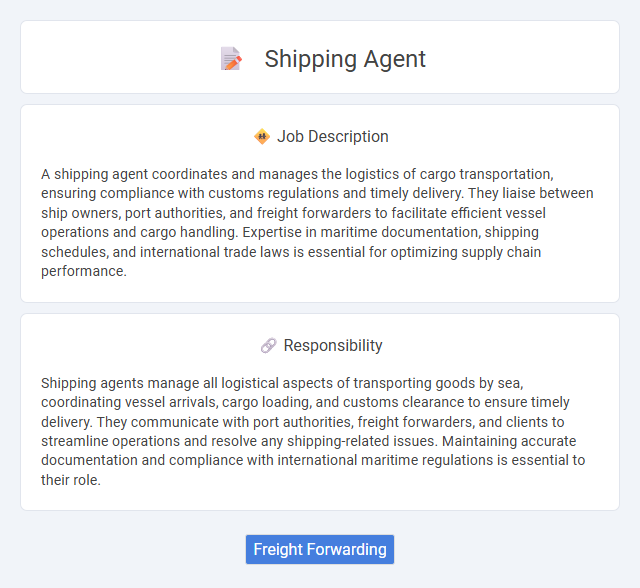
A shipping agent coordinates and manages the logistics of cargo transportation, ensuring compliance with customs regulations and timely delivery. They liaise between ship owners, port authorities, and freight forwarders to facilitate efficient vessel operations and cargo handling. Expertise in maritime documentation, shipping schedules, and international trade laws is essential for optimizing supply chain performance.
Those who possess strong organizational skills and can handle fast-paced environments are more likely suited for a shipping agent role. Individuals comfortable with multitasking, problem-solving, and effective communication probably find this job aligns well with their abilities. However, those who prefer routine or less dynamic work conditions may struggle to adapt to the constant demands and variability involved in shipping coordination.
Qualification
A shipping agent must possess in-depth knowledge of international shipping regulations, customs documentation, and logistics coordination to ensure smooth vessel operations. Strong communication skills and proficiency in maritime software systems are essential for managing cargo handling, scheduling, and compliance tasks effectively. Typically, candidates require a background in maritime studies, logistics, or supply chain management, along with relevant certifications such as Ship Operations and Management or Customs Brokerage.
Responsibility
Shipping agents manage all logistical aspects of transporting goods by sea, coordinating vessel arrivals, cargo loading, and customs clearance to ensure timely delivery. They communicate with port authorities, freight forwarders, and clients to streamline operations and resolve any shipping-related issues. Maintaining accurate documentation and compliance with international maritime regulations is essential to their role.
Benefit
Shipping agent roles likely offer benefits such as competitive salaries, opportunities for international travel, and exposure to global trade operations. Employees might gain valuable experience in logistics management and develop strong problem-solving skills. There is a probable potential for career advancement within maritime and transportation industries.
Challenge
Shipping agent roles likely involve navigating complex logistical challenges, such as coordinating shipments across multiple borders and ensuring compliance with varied regulations. Managing unexpected delays and handling communication between clients, carriers, and customs officials may require quick problem-solving skills and adaptability. The probability of facing high-pressure situations demanding swift decision-making seems significant in this position.
Career Advancement
A shipping agent coordinates logistics, manages documentation, and ensures compliance with maritime regulations to facilitate smooth cargo movements. Career advancement in this field often leads to roles such as operations manager, logistics coordinator, or port supervisor, with opportunities to specialize in freight forwarding or customs brokerage. Mastery of international trade laws and strong negotiation skills significantly enhance prospects for promotion and higher salary.
Key Terms
Freight Forwarding
Shipping agents in freight forwarding coordinate the efficient movement of goods across international borders, managing documentation, customs clearance, and transportation logistics. They ensure compliance with regulations, optimize shipping routes, and liaise with carriers, port authorities, and clients to facilitate timely delivery. Expertise in cargo handling, shipment tracking, and risk management is essential to minimize delays and costs in global supply chains.
 kuljobs.com
kuljobs.com